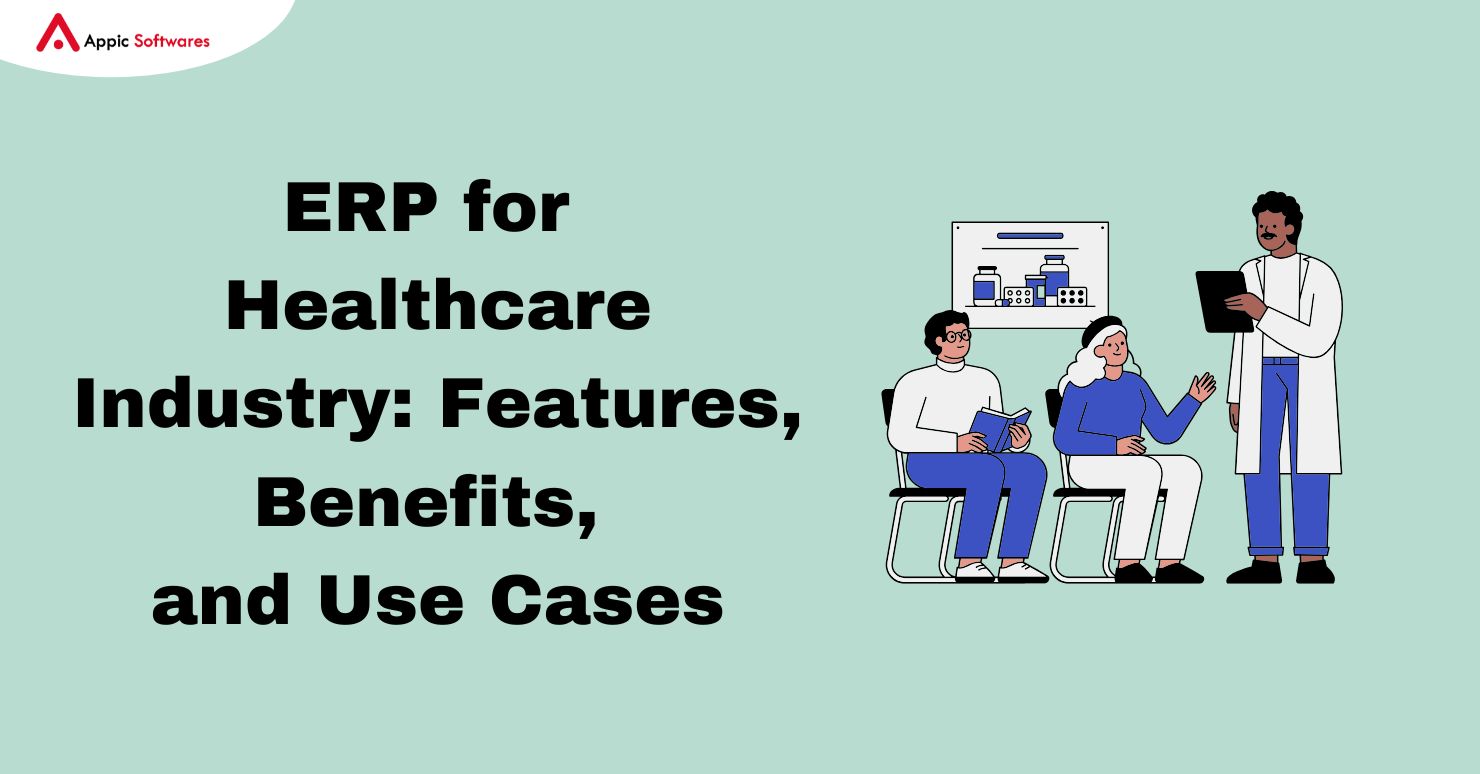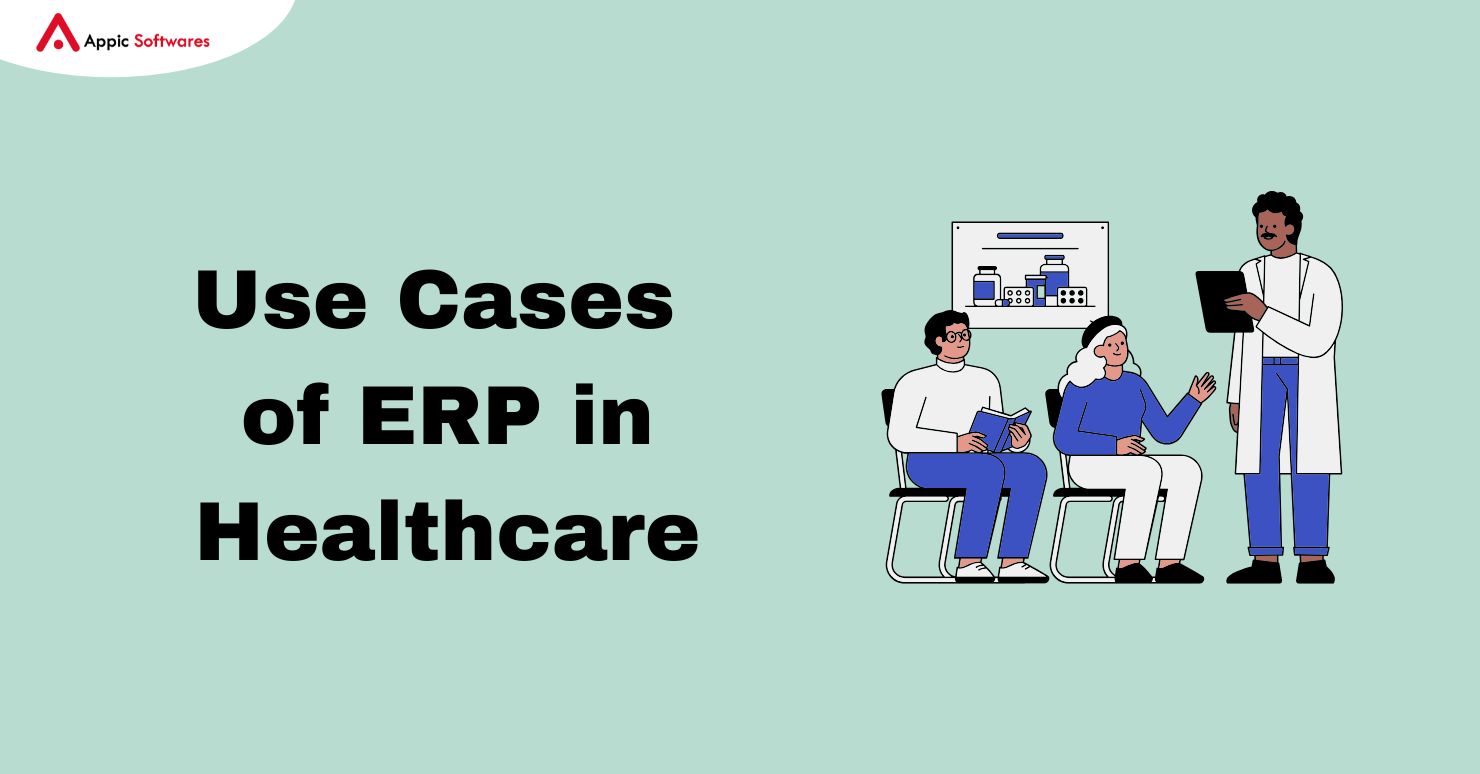
The healthcare industry is growing rapidly. With that growth comes increased complexity. Hospitals, clinics, and medical device manufacturers deal with massive amounts of data and tight regulations. They also need to offer fast, reliable, and affordable care. One way to manage all of this efficiently is through ERP.
Enterprise resource planning (ERP) systems are used in the healthcare industry to connect and manage all of the operations in a healthcare facility. These solutions make work easier, better care for patients, and lower costs of doing business. Healthcare ERP systems
As more providers look to integrate AI in healthcare, and ERP systems are becoming smarter platforms that mix data, automation, and intelligence to provide better results. This article talks about how ERP is used in healthcare, the main characteristics of medical ERP software, its benefits, examples of how it can be used, and the trends that are defining the future of healthcare ERP.
What is ERP in the Healthcare Industry?
ERP, or Enterprise Resource Planning, is a software solution that brings all departments of an organization under one digital roof. It connects and automates operations like finance, inventory, HR, patient data, compliance, and supply chain. Blockchain use cases also provide insights on ensuring data security in healthcare operations.
In healthcare, ERP solutions for healthcare help hospitals, clinics, labs, and medical device companies work more efficiently. It replaces outdated manual systems with a unified digital platform.
For example, when a patient gets admitted, an ERP system can automatically update room availability, notify the assigned doctor, manage patient records, and track medication inventory.
The global market for healthcare ERP systems was worth USD 7.42 billion in 2023. It’s expected to be worth USD 11.96 billion by 2030, after growing at a rate of 7.2% per year from 2024 to 2030.
Why Healthcare Needs ERP
The healthcare sector deals with high-pressure environments. Quick decisions, accurate data, and resource availability can literally save lives. Traditional systems are slow and disjointed. They lead to miscommunication, delays, and errors.
An ERP for healthcare industry connects everything in real time. It offers a central platform for all hospital operations. From patient registration to discharge, everything is tracked and managed efficiently.
Also, government policies and medical regulations demand strong compliance. ERP helps maintain audit trails, ensures data security, and simplifies regulatory reporting. When choosing ERP solutions for healthcare, factors like compliance, scalability, integrations, and vendor support matter most. Learn more via ways to prevent ai model collapse to safeguard data and maintain AI accuracy.
Key Features of Healthcare ERP Systems
ERP software for healthcare organizations comes with a wide set of features. These are tailored to meet the complex needs of hospitals, diagnostic labs, research centers, and medical equipment manufacturers.
1. Centralized Patient Data Management
One of the most important features of a healthcare ERP system is centralized patient records. This includes personal information, medical history, lab results, medications, allergies, and insurance details.
Doctors and nurses can access complete records with a few clicks. It improves diagnosis, reduces treatment errors, and saves time.
2. Real-Time Inventory and Supply Chain Monitoring
Hospit
als rely on thousands of supplies daily, from bandages to surgical tools. Without tracking, stockouts or overstocking can lead to financial losses and patient risk.
ERP solutions for healthcare automate inventory tracking. It monitors usage levels, sends alerts for reorders, and manages vendors. For medical device companies, ERP also handles parts, assembly, and warranty management.
3. Billing and Financial Management
Hospitals deal with large volumes of bills, insurance claims, reimbursements, and payments. Manual errors can be costly.
Medical ERP software automates financial workflows. It integrates with insurance systems, manages invoices, tracks patient payments, and generates financial reports. It ensures transparency and speed.
Bonus read: Fintech app development cost
4. HR and Workforce Management
Healthcare institutions have round-the-clock operations. They need shift rotations, duty rosters, leave tracking, and payroll management.
ERP systems simplify HR processes. They allow managers to assign shifts, approve leaves, track performance, and calculate payrolls accurately.
5. Scheduling and Appointment Management
Managing appointments is a challenge, especially in busy hospitals. ERP platforms include appointment booking and scheduling features. They prevent double-booking and reduce patient wait times.
It also helps in scheduling operation theaters, diagnostic equipment, and specialized services.
6. Compliance and Audit Readiness
Hospitals and medical manufacturers must meet legal and ethical standards like HIPAA, NABH, or FDA guidelines.
ERP in medical facilities ensures that every step—patient treatment, staff actions, equipment use, and financial transactions—is recorded and traceable.
During audits, reports can be generated quickly. It builds trust and protects against legal penalties.
7. Integration with Medical Devices and Labs
Modern ERP systems integrate with medical equipment like X-ray machines, ECGs, ventilators, and lab testing devices. This reduces manual data entry, improves accuracy, and accelerates diagnosis.
ERP for medical devices ensures machine readings are stored instantly into the patient’s file.
Bonus read: How much does it cost to develop goal based ai agents?
Benefits of Healthcare ERP Systems
The implementation of ERP brings measurable advantages to healthcare institutions.
1. Improved Patient Experience
Faster check-ins, no repeated paperwork, and real-time treatment updates make patients feel valued. ERP systems ensure seamless communication between departments, enhancing service quality.
2. Reduced Operational Costs
ERP systems minimize duplication of work, billing mistakes, and inventory waste. The average hospital can reduce operating expenses by 10-15% with an ERP platform.
3. Efficient Resource Allocation
ERP enables hospital managers to monitor resources, including beds, staff, labs, and ambulances. This helps assign them optimally based on availability and urgency.
4. Data-Driven Decisions
With real-time reports and dashboards, administrators can make smart decisions. From financial planning to patient care strategy, ERP offers insights based on actual data.
5. Better Regulatory Compliance
ERP platforms come with built-in compliance tools. They maintain digital logs, ensure patient data security, and simplify report submissions.
6. Business Scalability
As hospitals expand and open new branches, ERP can scale easily. It supports multiple locations and integrates new services without disrupting operations.
Use Cases of ERP in Healthcare

ERP systems are not just for hospitals. Their use cases span the entire healthcare ecosystem. Smart device data is also now integrated, just as described in mhealth applications.
1. Multispecialty Hospitals
Large hospitals deal with thousands of patients and hundreds of staff members. ERP systems manage departments like cardiology, neurology, oncology, and emergency with a shared data backbone.
Apollo Hospitals, for example, adopted ERP and saw a 20% improvement in bed turnover and 15% faster patient discharge times.
2. Diagnostic Labs and Imaging Centers
Labs process thousands of tests. Manual tracking delays results and increases errors. ERP systems automate sample tracking, test status, and report generation. It improves turnaround time and accuracy.
3. Medical Device Manufacturers
ERP for medical devices handles R&D, manufacturing, quality checks, packaging, and global distribution. It ensures compliance with international standards and manages equipment recalls efficiently.
Companies like Medtronic and Siemens Healthineers use ERP systems to manage supply chains and product lifecycle.
4. Pharmacy Chains and Retail Clinics
Pharmacy networks require stock monitoring across stores. ERP enables centralized inventory, pricing updates, prescription validation, and reporting.
Retail clinics like those in malls or airports use ERP for quick check-ups, lab report integration, and billing.
5. Government Healthcare Institutions
Public hospitals and rural health programs use ERP to track patient health data, monitor medicine distribution, and manage staff performance.
With data from ERP, governments can allocate budgets and healthcare services better.
ERP Implementation Challenges in Healthcare
While ERP systems offer several benefits, implementation comes with a few challenges.
1. High Initial Investment
Setting up a full-scale ERP system involves software licensing, hardware, and training costs. However, the long-term savings usually justify the expense.
2. Data Migration Issues
Transferring old patient and financial records to a new ERP platform requires careful planning. Mistakes can lead to data loss or inconsistencies.
3. Resistance to Change
Doctors and hospital staff may be resistant to new technology. Change management and proper training are crucial to ensure adoption.
4. System Downtime Risks
Any interruption in the ERP system can impact patient care. That’s why hospitals must choose reliable vendors and maintain backup plans.
Latest Trends in ERP Solutions for Healthcare
The ERP landscape is evolving quickly. Healthcare providers are adopting new trends to stay ahead.
1. Cloud-Based ERP
Cloud ERP is more affordable and scalable. It reduces the need for on-premise hardware and allows remote access. This is especially useful for multi-location hospitals and telehealth services.
2. AI and Predictive Analytics
AI-driven ERP systems predict medicine requirements, identify high-risk patients, and suggest treatment plans. This supports proactive healthcare delivery.
3. Mobile Accessibility
Mobile apps connected to ERP platforms allow doctors to check reports, approve prescriptions, or update patient notes on the go.
4. IoT and Smart Devices
ERP in medical settings now includes data from wearable devices, smart beds, and automated dispensers. It improves remote monitoring and patient engagement.
Choosing the Right ERP for Healthcare Industry
Selecting the right healthcare ERP depends on hospital size, services offered, and budget. Look for the following:
It should comply with HIPAA and other regional regulations. The system must be user-friendly and integrate with lab or radiology tools. It should offer support for mobile and cloud use. Also, make sure vendor support is reliable.
Popular ERP options in healthcare include SAP, Oracle NetSuite, Microsoft Dynamics, Odoo, and Infor Healthcare.
Conclusion
ERP for healthcare industry is a game-changer. It brings together departments, automates operations, ensures compliance, and most importantly, improves patient care.
Whether it’s a small clinic or a global medical device manufacturer, the benefits of ERP are clear: efficiency, transparency, and scalability.
As healthcare becomes more patient-focused and data-driven, investing in the right healthcare ERP systems will be key to staying competitive and compliant. It’s the future of smart healthcare delivery, especially when com
bined with advanced healthcare app development services that support real-time access, integration, and mobile convenience.
If you’re looking to streamline your operations or grow your medical business, consider adopting a modern ERP solution for healthcare. It’s the future of smart healthcare delivery.
Looking to optimize your healthcare operations and deliver better patient care? Partner with Appic Softwares for custom healthcare ERP solutions and healthcare app development services designed to fit your needs. Let’s build the future of smart healthcare together!
FAQs
1. Can I hire external developers to build a custom healthcare ERP?
Yes, you can hire Indian developers to build a custom ERP solution for your healthcare facility. Outsourcing can reduce costs and speed up development while ensuring high-quality results.
2. What does ERP mean in the healthcare field?
In the healthcare business, ERP is a software system that brings together several hospital activities like patient data, billing, HR, inventory, and compliance onto one platform. It makes things go more smoothly, cuts down on mistakes made by hand, and helps people make better decisions.
3. What are the benefits of a healthcare ERP system for hospitals?
Healthcare ERP systems make things easier by automating tasks, lowering expenses, making it eas
ier to access patient records, keeping track of inventories, and making sure bills are sent out on time. These systems
let hospitals spend less time on paperwork and more time on patient care.


